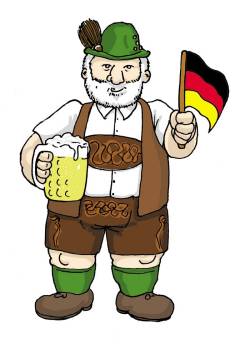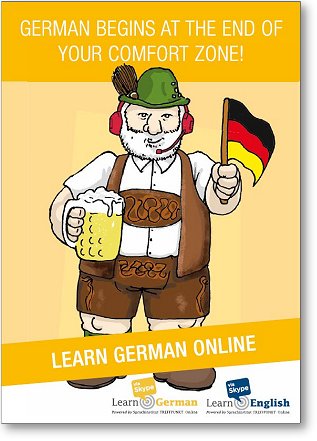
Living in Germany
16 tips to help you
get settled quickly
Are you planning your very first trip to Germany
where you intend to live and work? We have the
answers to 16 basic questions that will give you
some initial information you will need to make
your move easier.

1. Entry into Germany
Entering Germany from a
non-Schengen country can sometimes be a tedious
hurdle for non-EU citizens. This is one reason
why we are often asked to assist with immigration
formalities when an individual wants to attend
language courses in Germany. If you want to enter
an EU country as an individual traveler, you should
take note of the following 3 bits of information
that can save you from senseless detours and wasted
time and money:
- Before your travels, contact
the German embassy in your country. They can
provide you with information on the entry process
and the necessary papers – don’t forget: the
embassy decides whether or not you can enter Germany.
- A recommendation letter or proof of enrollment
in a language course in Germany can help, but
not if you do not meet the general entry requirements.
As mentioned above, you can learn about these
at the German embassy in your country. The German
embassy will decide on your case according to
the entry criteria for individuals from your
country.
- The only time that entry decisions
might not depend on the German embassy in your
home country, is in the case that you enter through
an accredited travel agent or at the invitation
of a company. In these situations, there may
be different entry procedures. For more information,
see: www.auswaertiges-amt.de. If your goal is
to study in Germany, you should not be entering
Germany with a tourist visa, but with a student
visa. Keep in mind that you often cannot convert
your tourist visa into a student visa once in
Germany, and that this change in status would
require you to return to your home country’s
German embassy.
2. Arrival Travelers
arriving at one of the major
hubs of Frankfurt, Munich or Cologne, Germany,
will find good infrastructure at these airports
that will allow them to quickly travel to their
final destinations. Metro or long-distance trains
often stop directly at the airport, and these are
usually the most convenient and fastest ways to
travel. Those who choose to take a taxi or rental
car into city centers must plan on longer travel
times.
>>> EasyTerra car hire compares car hire prices all over the world. Countries include Spain, Italy, France and Portugal. We guarantee the cheapest rates!
3. Security
Personal security, of yourself
and your belongings, is not really a problem in
Germany. For example, public parks and parking
lots are not generally guarded, cars are parked
on the streets, and there are no special residential
zones or gated communities. Of course, as you’ll
find everywhere, there are neighborhoods and situations
that pose a higher risk. For example, you should
not linger after midnight in the dark corners of
train stations in Germany’s larger cities.
4. Language
German belongs to the Indo-Germanic
languages, and you will notice that many English
words are quite similar to their German equivalents.
If a foreigner tries to speak German, this will
almost always be positively regarded by the Germans.
However, this does not mean that a German will
continue the conversation in German. Many Germans
believe that they should use their own foreign
language skills to assist foreigners, and usually
change to English as a gesture of courtesy and
respect. Even if you can accomplish a lot with
English in large German firms and in simple conversations
on the street, in hotels or while traveling, it
quickly becomes apparent that learning the German
language is fundamentally important to really participating
in everyday life in Germany and truly “understanding” the
Germans. In fact, important directions and signs
are often only written in German. If you want to
learn German, you can find recommended courses
at traingerman.com -
German Courses.

5. Transportation
Germany
has one of the densest networks of roads, highways
and rail links. Traveling by train and bus is comfortable,
fast and secure. Though normal long-distance train
tickets are rather costly, those who make travel
plans in advance, inform themselves of various
travel options, and make reservations early, can
save quite a bit of money on train travel. You
can find more information at www.bahn.de. For
those who prefer to travel by car, lots of helpful
information is available from the German Automobile
Club (www.ADAC.de).
It is also worthwhile to search the Internet with
the following keywords “Autovermietungen
(car rental companies)” and “autobahnnetz
(highway network)”, “staumeldungen
(traffic reports)”, “mobilität
(mobility)”, “reiseplanung (travel
planning)”, “strassenverkehr (traffic)”, “Reisen
in Deutschland (travel in Germany)” and on
sites such as Staumelder.com, < www.verkehrsinfo.de ,
and www.verkehrsinformation.de.
6. Climate
Germany
enjoys a temperate climate with four distinct seasons.
In winter and during the transitional periods of
spring and autumn, a warm sweater, a warm jacket
and weather-proof shoes should always be in your
suitcase. A rain jacket and an umbrella are also
good to have with you in every season.
7. Food
As in other countries, Germany’s larger supermarkets
offer a selection of food from Germany as well
as from many other countries. Specialty shops with
Turkish, Asian, Russian, French, Italian, Spanish
and Middle Eastern delicacies are often easy to
find - and are not only common in Germany’s
big cities. Survival Foods
8. Hotels
Apart from the usual international
hotel chains that can be found in Germany – including
the Hilton, Sheraton, Holiday Inn, and Best Western – to
name but a few – it is also recommended that
you take a look at local accommodation offers.
These will usually include family-run hotels or
guesthouses that offer overnight accommodations
in addition to their restaurants.
Even if you are not likely to find more than 3 star ratings at these establishments, such hotels usually have a more personal atmosphere, are less expensive, and are simply the perfect complement to getting to know a German city. If you're looking to get a quick idea for how much hotels are in a specific city, you can look up Berlin or Munich or other comparison sites.
9. Restaurants
The Germans love international
cuisine. This makes it easy to find Italian, Turkish,
Greek and Chinese restaurants even in smaller German
towns. It is worth it, however, to also take note
of the local cuisine. Some restaurants offer delicacies
that you should be sure not to miss. For example,
in northern Germany, you are likely to find fresh
fish dishes of herring or plaice; in Bavaria, dishes
like pork knuckles are typical; and in western
Germany, “sauerbraten” is a favorite
type of marinated beef. Typical restaurants with
local specialties often have names that include
the words “Gasthof” or “Gasthaus”,
and it is not uncommon for them to be named after
animals. Some common examples include: the “Goldener
Bär“ (Golden Bear), “Roter Hahn” (red
rooster), “Wilder Stier” (wild bull), “Zum
Storch” (stork), and “Schwarzer Adler” (black
eagle). When choosing your order, it helps to first
take a look at the so-called “Tageskarte” (Daily
Specials) or the extra page included in the menu
entitled “Heute empfehlen wir” (Today
we recommend…). This contains a list of
the recommended dishes, which are being offered
in addition to the standard menu on that particular
day. These are often dishes that are only available
seasonally and are therefore freshly prepared.
In addition, they are usually a particularly good
value for the money.
Recommendations for restaurants and shops with
German food worldwide could be find at Leibspeise.wordpress.com/.
Leibspeise is a private project of two German
travelers.
10. Tipping
A tip is always
given in restaurants and for small services in
hotels, at full-service gas stations, and in taxis.
Tip amounts are usually based on a minimum of 5%
to a maximum of 10% of the total bill. If you were
well served in a restaurant and are satisfied with
the meal, it is considered very rude not to give
a tip. This would also be embarrassing for the
other guests at the table.
11. Telecommunications
Anyone who intends to spend a few weeks or more in Germany, is best of buying prepaid phones in the next telephone shop that you encounter.
Whether you choose T-Mobile, E-Plus, Base, Vodafone,
O2 Germany or Kabeldeutschland, is more a matter
of taste, because their rates are similar. Cheaper
pre-paid rates are now available in supermarkets
such as Aldi, Lidl, Plus and Norma. Within your
own four walls, a fixed line provider is recommended
who can offer land line telephone service, mobile
telephone service, Internet service, and possibly
even cable TV as a package deal. Rates and technology
continue to change so rapidly, however, so it is
necessary to seek several offers from different
service providers once you have arrived and are
settled into an apartment.
12. Shopping
Traditionally,
the Germans purchased daily necessities in stores
that were located around the central marketplace
of their towns. Over time, however, these areas
have increasingly become pedestrian zones, and
families have begun to shop in industrial parks
on the outskirts of towns where they can buy goods
in bulk and pack them into closely parked cars.
For this reason, you will find most big supermarkets,
shoe stores, discount retailers, electrical and
hardware stores right outside of most German towns.
As a consequence, retailers in town centers are
struggling to survive while they also have to make
room for many souvenir shops, mobile shops and
boutiques. This trend, which began relatively late
in Germany in comparison to other countries, has
resulted in city grocers having a rather limited
selection – in fact, you may have to search
a while before finding a grocery store in a town
center. Nevertheless, the pedestrian areas are
generally very attractive shopping areas that are
interspersed with nice cafes and restaurants. A
modern example of this is the Friedrichstrasse
in Berlin. Other famous shopping streets in Germany
are the Kaufingerstrasse in Munich, the Zeil
in Frankfurt, the Mönckebergstrasse in Hamburg
and the Königstrasse ( "Kö")
in Dusseldorf and Stuttgart.
On www.kreditkartenvergleichen.com you will get a free e-book regarding "comparing credit cards" (explantions in German only).
13. Leisure,
sports, and cultural events
Open the local events
section of any German newspaper, and you will be
amazed by the variety of festivals, concerts, sporting
events, exhibitions and other leisure activities
that you can attend – and not just on weekends.
There really is something for everyone. Whether
you want to be active yourself or to just be entertained:
the newspaper is a good source of choices for making
spontaneous decisions. However, if you would like
to make plans further in advance, look for a city
magazine, which will usually be available with
up-to-date information every month or 14 days.
Here are the online versions of program guides
that can be found in some of Germany’s cities:
Gambling in Germany
Gambling in Germany
Gambling is just about as old as mankind. Even back during the age of the ancient Romans, various dice games were quite popular. In Germany, it seems as though one out of every two citizens is engaging in some form of lottery; that's about half the population.
There are several different forms of gambling that German citizens enjoy, probably the most popular being the various forms of lotteries regular and television lotteries.
14. Social life
German is a country
of club members. Hardly any German is not associated
with a club or organization that reflects his or
her interests and recreational pursuits. People
join clubs if they enjoy hiking, stamp collecting,
going to the theater, playing tennis or even planting
a vegetable garden. So, if you want to make quick
and lasting contacts in Germany, and you like socializing,
contact your local town hall to find out more about
local clubs and community education centers, which
are usually well established in Germany’s
larger towns and cities: www.vhs.de.
You
can also search for information about clubs near
you on several Internet sites:
15. To rent or to buy?
In Germany, it is very
common for individuals and families to rent an
apartment rather than buy. As a result, the supply
of rental properties is very high in comparison
to other countries. This trend is also due to the
fact that rental costs are often less than the
monthly costs associated with financing the purchase
of a comparable property. Housing offers from private
companies, brokers, as well as estate agents and
property managers, are customarily found in the
Saturday editions of local newspapers. In addition,
well-established Internet sites such as www.propertygate.com, www.immobilienscout24.de, www.immowelt.de, www.engelvoelkers.de, www.remax.de,
and www.planet-home.de can
also be helpful. For potential buyers who are less-knowledgeable
of an area, it is advisable to turn to the real
estate services of an established local agent.
Though they usually require a commission of up
to 3.25% of the rental or purchase price of the
property, their advice will be worth it if you
want to avoid processing errors, poorly written
contracts, and get into your dream home as quickly
as possible.
16. Expatriate
communities
While those living far from home used
to meet each other at a local “Stammtisch” (a
table reserved for certain individuals at a local
bar), it is more popular today to meet in virtual
communities that allow expatriates to form contacts
with other expatriates. In large German cities,
which often have a foreign population of more than
25%, it is easy to find and join groups of people
from your own country. The following virtual community
platforms are recommended for doing just that:
For more tips and information on how to successfully
get started in Germany, take a look at our book: "More
Than Manners: Business Etiquette in Germany".
You will find 35 other interesting
articles in our book.
Click on the image to order
directly.

Enjoy reading!

Gift voucher for German online lessons
How to be German
Breakfast lavishly, pre-book all your holidays years in advance, dress sensibly and obey the red man! How to be German presents all the little absurdities that make living in Germany such a pleasure. It's required reading for all Ausländer and for Germans who sometimes have the feeling they don't understand their own country.
We learn why the Germans speak so freely about sex, why they are so obsessed with Spiegel Online and why they all dream of being naked in a lake of Apfelsaftschorle. At the end, the only thing left to say to Adam Fletcher's love letter to Germany is "Alles klar!"

  order this book with Amazon.com order this book with Amazon.com
Enjoy reading!
Keywords: German stereotypes, sucessful with german clients, german business
protocol , german business practices versus american , german business
practices , german business etiquette and manners , german business
culture characteristics , german business culture , german business
correspondence etiquette , business etiquette in Germany , business
communication germany etiquette |
3rd edition!
ORDER NOW

Direct book order via PayPal >>>
or
via
credit card or bank transfer >>> >>>
|